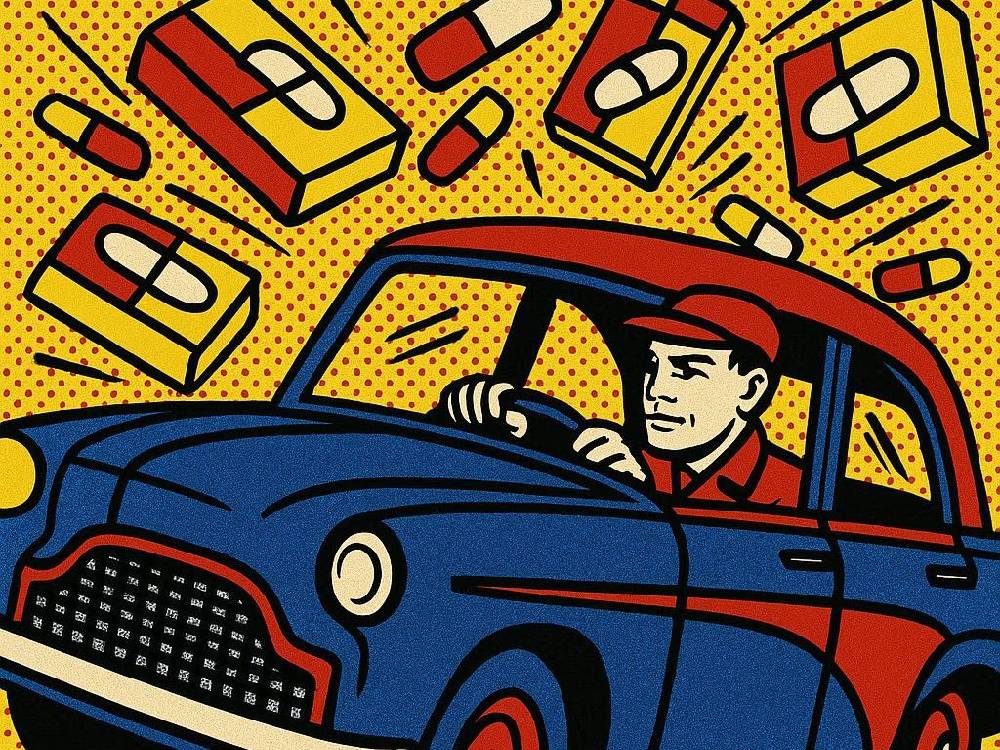Introduction
Prescription drugs and driving UK laws explained. You take your prescription.
You get behind the wheel.
And without realising it — you could be breaking the law.
That’s right.
Every day, thousands of UK drivers are unknowingly committing offences just by driving after taking common medications.
Even legally prescribed ones.
So, what does this mean for your car insurance?
And how can you stay safe — and insured — while managing your health?
Let’s break it down.
The Hidden Dangers Of Prescription Drugs And Driving UK
Here’s the thing — not all dangers on the road come from speeding or texting.
Some come straight from your medicine cabinet.
Everyday drugs, from strong painkillers to antidepressants, can slow reaction times, blur vision, and cause extreme drowsiness.
Even that “harmless” antihistamine or cough syrup could make you unsafe behind the wheel.
Why?
Because many of these medications interfere with your central nervous system, dulling focus and coordination — exactly what you need to drive safely.
And that’s where the real risk begins.
If your medication affects your driving ability, insurers could refuse to pay out in the event of an accident.
Want to understand how different policy types handle that?
Check out car insurance options to see what fits your situation best.
What The Law Actually Says About Prescription Drugs And Driving UK
Now — here’s where it gets serious.
According to GOV.UK, it’s illegal to drive with certain “legal” drugs in your system if they impair your driving.
Even if your doctor prescribed them.
The law lists specific substances that could land you in trouble.
These include amphetamines, diazepam, clonazepam, lorazepam, and methadone — just to name a few.
If you’re over the specified blood limit or showing signs of impairment, police can test you on the spot.
And yes, that applies even if your prescription is valid.
The rule is simple:
If it affects your driving, you’re responsible — not your doctor, not your pharmacist, you.
That’s why you should always read your medicine leaflet before driving.
Those words “may cause drowsiness” aren’t a suggestion — they’re a legal warning.
Want to know which level of insurance could help protect you if the unexpected happens?
Compare coverage with comprehensive vs third party options before making your choice.
When Medication And Car Insurance Collide
Here’s the catch — insurers care about one thing: risk.
If you cause an accident while under the influence of a drug that impairs you — even a legal one — your insurer could refuse your claim.
And that’s not just speculation.
Insurance providers are within their rights to void your policy if they believe you were unfit to drive.
Think about it.
If you were prescribed a strong sedative and still got behind the wheel, that’s considered negligence — no matter how innocent your intentions were.
The result?
Your claim gets rejected, and your policy could be cancelled.
Even worse, future premiums might skyrocket because of it.
It’s a sobering thought, but it’s one every driver should understand before taking medication and heading out.
Curious about how brokers handle these situations?
You’ll find answers in our guide on the disadvantages of buying car insurance from brokers.
Prescription Drugs And Driving UK: The Medicines That Raise Red Flags
So, which medicines should set off alarm bells?
Let’s look closer.
Certain drugs are well-known for their side effects — especially those that warn against “operating heavy machinery.”
These include:
- Opioid painkillers such as codeine, morphine, and tramadol.
- Tranquillisers and anti-anxiety drugs like diazepam or lorazepam.
- Strong antidepressants that can cause dizziness or fatigue.
- Sleeping tablets that leave lingering drowsiness even the next morning.
Even some over-the-counter antihistamines can make you too tired to drive safely.
The scary part?
Most of these are prescribed daily across the UK.
That means ordinary, responsible people are unknowingly taking massive legal and financial risks — every time they start their car.
Prescription vs Responsibility
Here’s something many drivers don’t realise.
Just because your doctor prescribed it doesn’t mean you’re automatically protected.
Even with a valid prescription, you’re still responsible for ensuring you’re safe to drive.
If the medication makes you dizzy, disoriented, or even slightly drowsy — that’s on you.
And if you get caught driving impaired, not only could you face fines or prosecution, but your insurer could also cancel your policy instantly.
So, what can you do?
Check how you feel after taking your medication.
Don’t drive unless you’re 100% sure you’re alert and focused.
Want to save money while staying responsible?
Learn some clever hacks with 5 ways to save money on car insurance.
What To Do If You’re Unsure
So, what happens if you’re not sure whether it’s safe to drive?
Here’s the first rule — never guess.
Medication affects everyone differently.
What makes one person sleepy might barely touch another.
That’s why it’s crucial to read your medication leaflet carefully.
Look for warning lines like “may cause drowsiness” or “do not operate machinery.”
If you’re still uncertain, talk to your GP or pharmacist.
They can tell you whether it’s safe to drive or if you should take a break until your body adjusts.
And remember — even if you feel fine, police officers can still stop and test you if they suspect impairment.
If you fail, no amount of “but it’s legal” will save your licence.
It’s always better to pull over, rest, and stay cautious.
Need to double-check your cover before you drive?
Head to how do I check if my car is insured? to confirm your policy status in seconds.
Staying Protected — Insurance That Has Your Back
Here’s where being upfront pays off.
If you take prescription medication, honesty with your insurer is non-negotiable.
Tell them about any long-term medication or medical condition that could affect your driving.
Why?
Because full disclosure could be the difference between a valid claim and a cancelled policy.
Insurers consider medication as part of your risk profile.
If you hide information and later get into an accident, they can void your policy entirely.
Transparency builds trust — and ensures your coverage is airtight.
Even better, by comparing quotes from different insurers, you can still find cheap car insurance UK policies that suit your needs, even with disclosed health details.
Looking to switch your current policy?
Learn how with switch car insurance to stay protected and save at the same time.
The Bottom Line — Don’t Risk It
Let’s be blunt.
No savings or convenience is worth risking your licence, your car, or your financial security.
If your medication causes side effects, don’t drive — no matter how short the trip is.
Even a minor accident could spiral into major legal trouble if you’re found impaired.
Worse still, your insurer might refuse to cover damage or injuries, leaving you to handle thousands in costs on your own.
So take control now.
Know your limits.
Check your prescriptions.
And always make sure your cover is up to date.
If you’re after the best protection without paying a fortune, explore very cheap car insurance options that keep you legal, safe, and stress-free.
Conclusion
Driving under the influence of medication isn’t just risky — it’s potentially criminal.
Even legal prescriptions can impair your judgement, slow your reflexes, and void your insurance in seconds.
But with a little awareness and the right policy, you can protect yourself and others on the road.
Check your medication labels.
Talk to your doctor.
And compare quotes with Cheap Car Insurance UK to stay insured, informed, and in control.
Looking to learn more about how everyday habits can impact your insurance?
You’ll enjoy:








